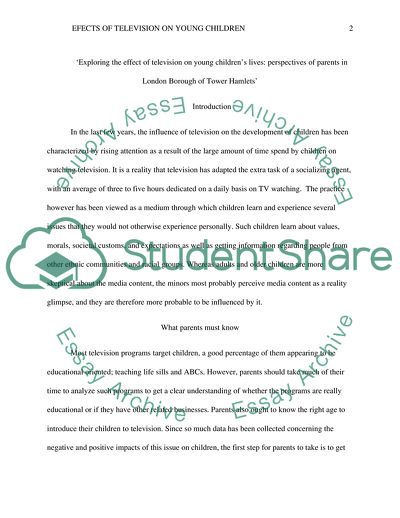Cite this document
(Perspectives of Parents in London Borough of Tower Hamlets Essay Example | Topics and Well Written Essays - 1750 words, n.d.)
Perspectives of Parents in London Borough of Tower Hamlets Essay Example | Topics and Well Written Essays - 1750 words. https://studentshare.org/education/1800115-exploring-the-effect-of-television-on-young-childrens-lives-perspectives-of-parents-in-london-borough-of-tower-hamlets
Perspectives of Parents in London Borough of Tower Hamlets Essay Example | Topics and Well Written Essays - 1750 words. https://studentshare.org/education/1800115-exploring-the-effect-of-television-on-young-childrens-lives-perspectives-of-parents-in-london-borough-of-tower-hamlets
(Perspectives of Parents in London Borough of Tower Hamlets Essay Example | Topics and Well Written Essays - 1750 Words)
Perspectives of Parents in London Borough of Tower Hamlets Essay Example | Topics and Well Written Essays - 1750 Words. https://studentshare.org/education/1800115-exploring-the-effect-of-television-on-young-childrens-lives-perspectives-of-parents-in-london-borough-of-tower-hamlets.
Perspectives of Parents in London Borough of Tower Hamlets Essay Example | Topics and Well Written Essays - 1750 Words. https://studentshare.org/education/1800115-exploring-the-effect-of-television-on-young-childrens-lives-perspectives-of-parents-in-london-borough-of-tower-hamlets.
“Perspectives of Parents in London Borough of Tower Hamlets Essay Example | Topics and Well Written Essays - 1750 Words”. https://studentshare.org/education/1800115-exploring-the-effect-of-television-on-young-childrens-lives-perspectives-of-parents-in-london-borough-of-tower-hamlets.


